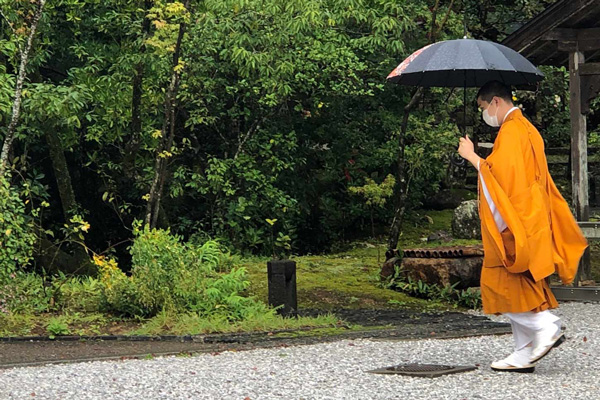The Shikoku Pilgrimage Temple Guide
Basic knowledge of the pilgrimage 2

Attitude toward the pilgrimage
Kōbo Daishi engaged in Buddhist training on Shikoku, his birthplace. He thought about his life, and his ideals, and worked hard to explain them to as many people as possible. He believed the protection of the nation and saving people are important and wished people happiness and prosperity. He also encouraged people to strive to make full use of their abilities and talents. People follow his journey when they do the Shikoku Pilgrimage.
A pilgrimage is also an act that seeks a transformation within you. Even if you don't think about it deeply, just by visiting the temples, your mind will be affected. You do not need to read difficult books, interpret difficult scriptures, or undergo penances beyond the reach of ordinary people.
However, going on a pilgrimage is, even if only temporarily, an act of leaving this world for a holy place and requires you to follow various manners and rules. If you keep in mind the meaning of these behaviors and actions, you will surely be able to deepen your pilgrimage experience. Since ancient times, prayer has been important on the pilgrimage. Please pray to the principal image and to Kōbo Daishi with all your heart.
On the way and at the temples
The 88 temples are for both pilgrims and local believers. In addition, some temples and residents regard the pilgrims as people under training. For this reason, facilities dedicated to pilgrims are very simple. They are maintained with the help of temple staff and local people.
Compared with the old days, the facilities are much improved now, but please understand that the temples are generally not like sightseeing spots. Please follow the rules such as, “Do not make the bathroom dirty when you use it,” “Do not honk your horn or make the engine too loud near a private house in the early morning,'' and “Take your garbage home.”
The people of Shikoku call pilgrims Ohenro-san, respect them, and treat them warmly because they have seen them devote themselves to Kōbo Daishi and practice diligently. Please be respectful when visiting temples.
About the Jūzenkai
The Jūzenkai (the Ten Precepts) are said to have been the code of conduct for pilgrims since ancient times. In your life, do not step on the accelerator too much, don't brake too much, but use the accelerator and brake moderately. This is a commandment for safe driving in life.
Please recite (declare) these ten precepts in front of Kōbo Daishi, and continue your pilgrimage while telling yourself to do good deeds.
Jūzenkai
| Fusesshō | I will respect the lives of all living beings. |
| Fuchūtō | I will not steal and will deal with others with great care. |
| Fujain | I will practice moderation concerning sexual activities. |
| Fumōgo | I will not tell lies. |
| Fukigo | I will not use exaggerated and extravagant language. |
| Fuakku | I will not speak badly of others. |
| Furyōzetsu | I will always speak truthfully. |
| Fukendon | I will not be greedy and covet possessions. |
| Fushinni | I will not get angry but will remain even-tempered. |
| Fujyaken | I will not think bad thoughts. |
